
Lieutenant General John Randolph Vines is the former commander of the U.S. Army's XVIII Airborne Corps and Multi-National Corps – Iraq.

Lieutenant General William James Lennox Jr. of Houston, Texas, was the 56th Superintendent of the United States Military Academy at West Point, New York from 2001 to 2006.
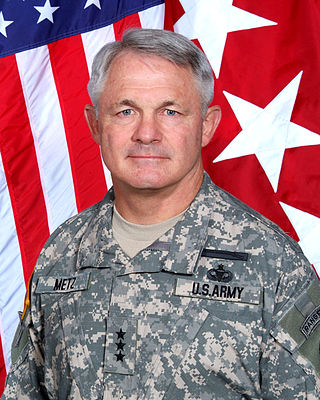
Thomas Fredric Metz is a retired lieutenant general in the United States Army. Metz retired from the Army in Jan 2010 after more than 40 years of active military service. His tour of duty prior to retirement was as the director, Joint Improvised Explosive Device Defeat Organization., leading the DOD organization tasked with finding and fielding ways to defeat the IED threat. Previously he was the deputy commanding general and chief of staff, U.S. Army Training and Doctrine Command. Previous to that assignment he was commanding general of the U.S. III Corps and Fort Hood. He assumed command of III Corps on 7 February 2003.

Lieutenant General Franklin Lee Hagenbeck is a retired United States Army officer who served as the 57th Superintendent of the United States Military Academy from June 2006 to July 2010. Previous to his assignment at West Point, he was the Deputy Chief of Staff, G-1 United States Army, Washington, D.C.
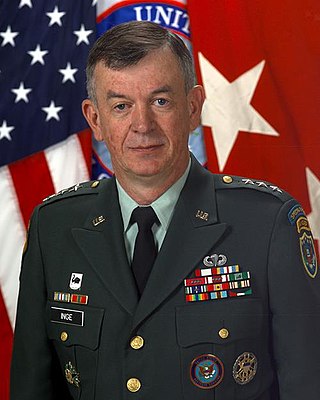
Lieutenant General Joseph Richard Inge was an officer of the United States Army. He served as Deputy Commander, United States Northern Command, and Vice Commander, United States Element, North American Aerospace Defense Command, headquartered at Peterson Air Force Base, Colorado in 2007. He retired in 2007, after a 38-year career.
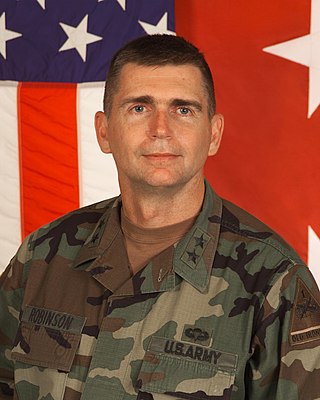
Major General Fred "Doug" Robinson Jr. a native of Bolivar, Tennessee, was commissioned a second lieutenant in the United States Army from the University of Tennessee. As of 2007, he was commanding general of Army Research, Development and Engineering Command in the United States Army.

William H. Brandenburg is a retired major general in the United States Army. He last served as deputy commanding general, U.S. Army, Pacific, August 8, 2003. Prior to his last assignment, he was deputy commanding general for training and readiness, I Corps and Fort Lewis. From November 29, 2004, until December 1, 2005, he deployed to Iraq as deputy commanding general and commanding general, Task Force 134.

R. Steven Whitcomb is a retired United States Army lieutenant general. He was commissioned as a second lieutenant upon graduation from the University of Virginia in 1970. In his final assignment he served as Inspector General of the United States Army.

General William Gilbert Townsend Tuttle Jr. was a United States Army four-star general who served as Commanding General, United States Army Materiel Command from 1989 to 1992.
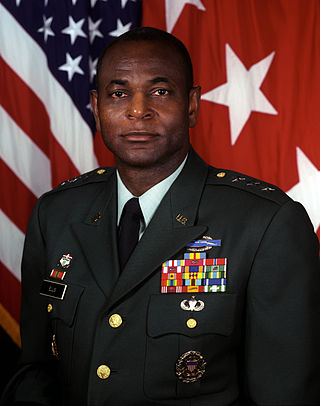
Larry Rudell Ellis is a former United States Army officer who served as the Commander of United States Army Forces Command from November 19, 2001 until 2004, following his assignment as the Deputy Chief of Staff for Operations and Plans of the Department of the Army.
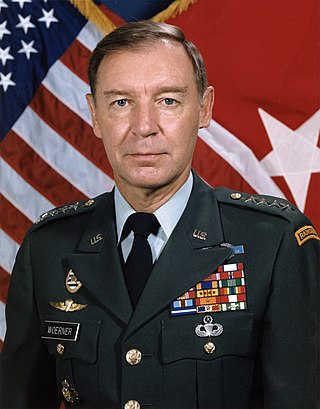
Frederick Frank Woerner Jr. was a four-star general of the United States Army, Commander-in-Chief of United States Southern Command, Chairman of the American Battle Monuments Commission, and professor at Boston University.

General William Allen Knowlton was a United States Army four-star general, and a former Superintendent of the United States Military Academy. As a full general, he served as Commander, Allied Land Forces South East Europe, and as the United States Military Representative to the North Atlantic Treaty Organization.

Michael Spigelmire is a retired American lieutenant general.
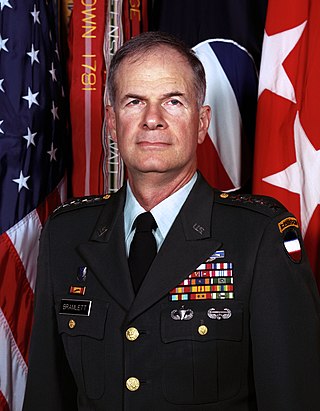
David Anthony Bramlett is a retired United States Army four-star general who commanded United States Army Forces Command from July 1, 1996 to August 31, 1998, after serving as Deputy Commander in Chief and Chief of Staff, United States Pacific Command at Camp H. M. Smith, Hawaii. During his tenure as Deputy Commander, he was the interim commander of Pacific Command after the commander, Admiral Richard C. Macke, came under fire for comments he had made in regard to the 1995 rape scandal in Okinawa that involved three United States servicemen.

John Joseph Timothy Hennessey was a United States Army four-star general who served as Commander in Chief, United States Readiness Command (USCINCRED) from 1974 to 1979.
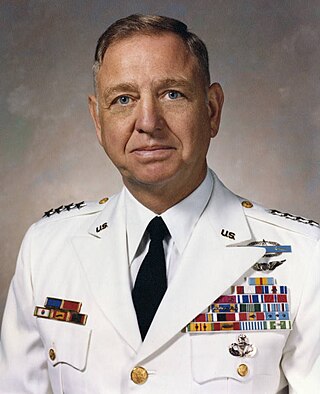
Sam Sims Walker was a United States Army general who served as the Commanding General of Allied Land Forces, South East Europe from 1977 to 1978.

Walter Francis Ulmer Jr. is a retired lieutenant general in the United States Army.
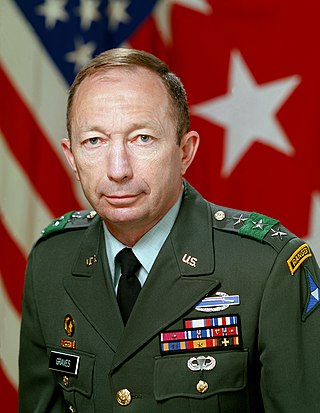
Richard Gordon Graves is a retired lieutenant general in the United States Army. He was Commander of III Corps and Fort Hood. He is a 1958 graduate of the U.S. Military Academy.
![<span class="mw-page-title-main">Frederic J. Brown III</span> U.S. Army lieutenant general]](https://upload.wikimedia.org/wikipedia/commons/thumb/2/21/Frederic_J._Brown_III_%28U.S._Army_lieutenant_general%29.jpg/320px-Frederic_J._Brown_III_%28U.S._Army_lieutenant_general%29.jpg)
Frederic J. Brown III is a retired United States Army officer. A veteran of the Vietnam War, he attained the rank of lieutenant general and was a recipient of the Army Distinguished Service Medal (2), Silver Star, Legion of Merit, Distinguished Flying Cross, and multiple awards of the Bronze Star Medal. Brown is best known for his service as Chief of Armor and Cavalry from 1983 to 1986 and command of Fourth United States Army from 1986 to 1989.
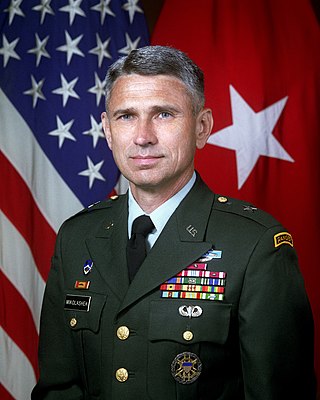
Paul T. Mikolashek is a retired United States Army officer. A veteran of the Vietnam War, he served from 1969 to 2005 and was Inspector General of the United States Army from 2002 to 2005. Mikolashek attained the rank of lieutenant general, and his awards and decorations included the Defense Superior Service Medal, Legion of Merit (2), Bronze Star Medal (2), Defense Meritorious Service Medal, Master Parachutist Badge, Combat Infantryman Badge, Ranger tab, Joint Chiefs of Staff Identification Badge, and Army Staff Identification Badge.




















![<span class="mw-page-title-main">Frederic J. Brown III</span> U.S. Army lieutenant general]](https://upload.wikimedia.org/wikipedia/commons/thumb/2/21/Frederic_J._Brown_III_%28U.S._Army_lieutenant_general%29.jpg/320px-Frederic_J._Brown_III_%28U.S._Army_lieutenant_general%29.jpg)
